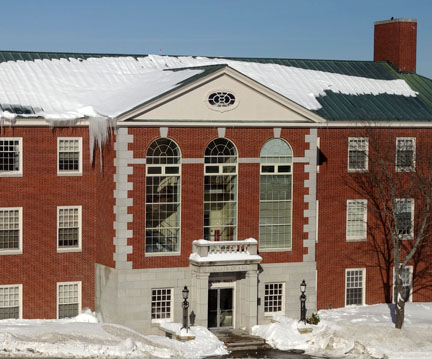As the University of New Brunswick loses its fourth dean in three years, students are asking there be greater accountability and transparency around how the role is filled in the future.

The school said today it will immediately begin consultations with faculty on the appointment of an acting dean for the law school.
In a statement, vice president Tony Secco said UNB is “committed to ensuring a strong future for its law school.”
In January, the university engaged Neil Gold, a professor emeritus in law and former dean of law at the University of Windsor, to investigate and report confidentially on relations between now-resigned dean Dr. Jeremy Levitt, and certain faculty members within UNB’s law school.
“I appreciate the interest and passion many people have shown in UNB Law. This has demonstrated how important the school is to our community and to our province,” said Secco. “The University of New Brunswick’s law school has long been considered Canada’s great small law school and it will remain so.”
On Tuesday, the university announced Levitt offered to voluntarily resign from the deanship effective immediately. He will be on “research leave” until July 2015 when he will “leave UNB to return to, and help advance, his home institution in Florida.”
“In light of Dr. Levitt’s voluntary resignation from the position of dean of the law school, the university thereby concludes the independent investigative review process,” said Dr. Secco.
Since early February, senior officials at the school have declined to give media interviews, instead providing prepared statements through the communications department.
When asked for comment, Levitt sent the following statement and would not grant an interview for further questions:
I am grateful to President Eddy Campbell for providing me with the wonderful opportunity to serve as Dean of Law and vice chancellor’s chair at the University of New Brunswick. I have decided to return to, and help advance, my home institution in Florida. I offered to voluntarily resign because I believe that it is in the best interests of my family and I. I am convinced that resolving internal debates about the vision and mission of the Faculty of Law is vital to its future success and UNB’s. UNB has excellent students and staff, a vibrant core of deans, and a loyal and dedicated alumni base. The future of UNB is indeed strong.”
When asked today if the school’s problems may stem from what some have called a “toxic environment” the the administration would only provide the following statement:
UNB is committed to a strong future for UNB Law and we want to be sure that the concerns and the ideas of faculty, staff and students are taken into account as we move forward. The interim leadership at the school met with staff and students on a number of occasions to listen to ideas and concerns. We will move to help those who may feel division or hurt, without casting blame. We want to hear from people about how to build up our law school as we want the new, full-term leadership to be able to set his or her own vision for the faculty, in keeping with consultations, our strong traditions and noble history.”
In February, associate dean of law Janet Austin resigned, and in doing so indicated she was resigning in an act of support for Levitt and his vision for the law school. Two other female professors had also taken full or partial leaves from the law school.
"I was dismayed to learn of his resignation and am honoured to have worked with the first black male law dean in Canada," Austin told
Legal Feeds. "I worked closely with Dr. Levitt and found him to be someone who passionately cares about students and who works tirelessly to advance their interests. The dean and I worked together to try to bring about positive changes to the law school, however, in the end there were forces that were fiercely opposed to any change."
Lyle Skinner, UNB senator and a 4th-year student, says the events culminating in Levitt’s resignation as dean “highlights that UNB needs to ensure that search committees select a senior administrator using all relevant information, with consultation from appropriate professional bodies such as the relevant law society.”
Skinner told
Legal Feeds that “due to the importance of this issue, senators used a special provision of the UNB Act to compel president Eddy Campbell to hold an extraordinary meeting. The president chose to hold this meeting one hour before the regular meeting of Senate. The president did not facilitate sufficient time to debate a serious university governance issue.”
He went on to note: “My research indicates, the selection committee chaired by vice president academic Tony Secco finalized Levitt and another ‘high profile individual’ as candidates. The other candidate requested that the process be conducted ‘in confidence’. Dr. Secco as chair agreed to this request. This confidentiality limited the ability of the UNB community to provide informed feedback and resulted in the current situation.”
Skinner said if a candidate for a senior administrative position is “unwilling to make their candidacy publicly known due to a perceived reputational impact, then their candidacy should be rejected. An individual candidate’s reputational self-interest should not trump UNB’s collegial decision making process.”
Yesterday Skinner sent the UNB Secretariat
a series of motions designed to reform UNB’s Search Committee procedures. They will be discussed next Tuesday.
Update 6:10 pm: Comments from Janet Austin added.

 The school said today it will immediately begin consultations with faculty on the appointment of an acting dean for the law school.
The school said today it will immediately begin consultations with faculty on the appointment of an acting dean for the law school.